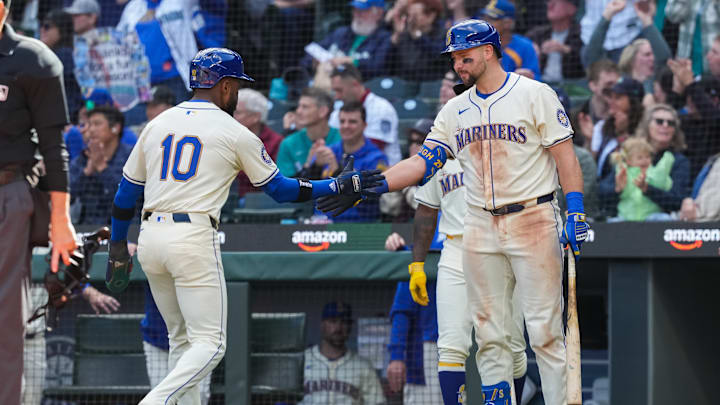With no baseball being actively played by the Seattle Mariners, the front office is likely busy at work setting things in place for next year. Jerry Dipoto will have his work cut out for him when the offseason arrives five days after the conclusion of the World Series.
A big part of that work is establishing payroll and, more specifically, sorting out arbitration salaries. Seattle has a dozen players up for raises at varying price points, but some may end up cost too much for the M's liking. Is it possible they look to non-tender or trade some guys because of this?
Mariners 2025 arbitration salaries: Seattle may not be able to afford a few raises
3B Luis Urías - $5 million
Despite having two full seasons with the Brewers under his belt, Urias spent most of this year in Triple-A Tacoma. He played well in the minor leagues but wasn't able to have much of an impact at third base for the Mariners, ceding most of his playing time to Josh Rojas. He was reasonably productive over his 109 plate appearances, posting a 105 OPS+, but the production may not equal the projected $5 million he'll earn.
He doesn't hit the ball particularly hard, isn't an outstanding glove, and would earn around the same amount as George Kirby and Cal Raleigh, two players vastly more important to the success of the team. While $5 million may seem insignificant to big market teams with seemingly bottomless coffers, saving that amount could lead to a few extra bullpen arms, a platoon bat, or be the final piece of a larger free agent contract.
One way Rojas can argue his case to stay could be with a return to second base, a position in which he has over 1,000 big league innings of experience (and one that will likely become vacant if the Mariners choose to buy out the remaining duration of Jorge Polanco's contract). He's still shaky as a defensive middle infielder, but the offensive expectations from second base are typically lower than they are for third base.
3B Josh Rojas - $4.3 million
Similar to Urías, Rojas was below-average offensively. In fact, if you disregard the first month of the season, his .578 OPS would be the worst on the team by a decent margin, beating out Mitch Haniger's .620 OPS (84 OPS+). Unlike Urías, he still has a strong defensive upside, accumulating seven Defensive Runs Saved, which may be his saving grave heading into arbitration negotiation. But if the Mariners are serious about improving their offense for next year, they may be willing to sacrifice some defense to clear payroll for a bigger bat.
Still, $4.3 million isn't too a giant chunk of change to have returned to the team's pockets, especially if they're in the market for some of the more sought-after free agents this winter. With neither Rojas nor Urías standing as clear frontrunners for the full-time job at third base, it wouldn't be surprising if one (or both) of them gets moved to clear a little room in the budget.
OF Randy Arozarena - $11.7 million
The largest projected arbitration salary by a decent amount, Arozarena's situation leaves the team at a crossroads. He was great with Seattle, logging a 118 OPS+ over his 239 plate appearances as a Mariner and was one-third of an electric outfield picture containing Julio Rodríguez and Victor Robles.
If he does receive the nearly $12 million MLBTradeRumors is anticipating he will be priced at in arbitration, he would have the fifth-highest 2025 salary behind Luis Castillo ($24.15 million), Julio Rodríguez ($20.19 million), Mitch Haniger ($15.5 million), and Mitch Garver ($12.5 million). While this amount may seem justified given how his contributions stacked up against Garver and Haniger, the front office will have a much easier time trading him as opposed to finding new homes for Haniger and/or Garver. Arozarena carries value, too, since he's controlled through 2026.
Nonetheless, Arozarena makes a strong case for staying given his remaining team control and consistent performance on the field year after year. If the team is serious about wanting to be competitive in 2025, it may be hard to find a more cost-efficient replacement for him. But we've seen the Mariners do odd things before, so we wouldn't put it past them.
